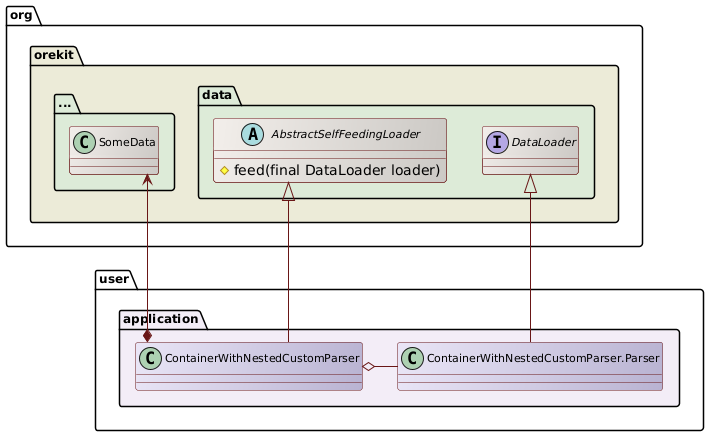Application data
Applications based on Orekit will often need to load explicitly application-specific data, in addition to the data implicitly loaded by the library itself using the data contexts. This may include for example orbit and attitude ephemeris files, measurements, ground stations, reference GNSS solutions…
Merging application and library data
Some of the mechanisms originally created for Orekit data loading needs like separation between data storage and data formats or filtering may be used for application data too.
The simplest way to reuse all mechanisms transparently is to merge application data
and library data using the default configuration with
the DataProvidersManager and put the files to be read either at the same location
as the library (for example an orekit-data folder in home directory) or at an
application-specific location for which one DataProvider (typically a DirectoryCrawler)
has been set up and registered to the DataProvidersManager.
Custom data formats
Orekit supports a large set of data formats natively. For example, leap seconds information
can be loaded from file tai-utc.dat provided by USNO or from file UTC-TAI.history provided
by IERS. EOP data can be retrieved from weekly Bulletin A, monthly Bulletin B, yearly EOPC04,
rapid data finals files. Gravity fields can be loaded from files in EGM, GRGS, ICGEM or SHM
formats.
This large number of supported formats is made possible thanks to an extensible low level data loading architecture. New formats are added to the list regularly using this architecture, but users may also benefit from it and add support for their own formats in their applications. It is therefore possible to use Orekit in a system that already has some established mission-specific data formats.
Orekit also supports on-the-fly filtering of data during the loading process. Filtering
can be used for example if data is stored on disk in compressed or enciphered form and
should be uncompressed or deciphered at load time. Predefined filters readily available
in Orekit allow to uncompress files using gzip (files ending in .gz), Unix compress
(files ending in .Z), or Hatanaka method for RINEX files (files with a specific pattern,
ending with either .##d where ## is a two-digits year for RINEX 2 files or .crx
for RINEX 3 files).
Users may also benefit from the filtering architecture and add support for their own filters in their applications, for example to decipher sensitive data.
Parsing custom data formats
If some data format is not supported by Orekit, then a
specialized DataLoader implementation can be set up by users.
The most important method in this class is the loadData method. This method takes
as a parameter an already open InputStream from where data can be read using regular
Java API. The second parameter is the name of the data file being loaded, it is only
intended to generate meaningful error messages to end users if the file happens to be
corrupted. The InputStream is already open and has already been passed through
all applicable filters. This means that users only need to take care of the parsing itself,
and their custom data loader will be automatically able to manage data coming from
files, from the network, compressed or not as all these features have already been
taken care of by the data providers and the data filters.
The way the data loaded is provided back to Orekit is not specified in the
API. In fact, it depends on the data type. One recommended way to manage this
is to create a dedicated container class for the data (ContainerWithNestedCustomParser in
the following diagram) extending the AbstractSelfFeedingLoader class, and have a nested
class Parser inside the container that implements DataLoader.

As the Parser is nested within the container, it can populate it while parsing.
In order to have the nested parser being fed, a protected method feed in the
AbstractSelfFeedingLoader is called internally with the Parser in argument,
and this method will trigger the configured DataProvidersManager to feed itself.
Users can look at the implementations of BulletinAFilesLoader and YUMAParser
to see how it works.
This can be used either to load data that is already known to Orekit (like EOP), but only the file format is unknown, or it can be used to load application data.
Explicit loading
The default configuration may however not suit specific needs for application data, for example when only one specific ephemeris must be loaded in a directory containing many similar files, depending on users selections within a list.
In this case, it may still be advantageous to rely on the lower level mechanisms
like filtering by configuring an application-specific FiltersManager.
In this case, rather than implementing a DataLoader, users may create their own parser
from scratch (or use one of the ephemeris loaders for standard formats supported by Orekit)
in such a way they use a DataSource to specify where the bytes or characters to be parsed
come from, rather than using directly a File, an InputStream or a Reader.


